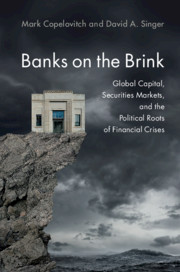Book contents
- Banks on the Brink
- Political Economy of Institutions and Decisions
- Banks on the Brink
- Copyright page
- Dedication
- Contents
- Figures
- Tables
- Preface
- Acknowledgments
- 1 The Politics and Economics of Financial Instability
- 2 Banking Crises, Capital Flows, and Financial Market Structure
- 3 Capital Inflows, Market Structure, and Banking Crises
- 4 O Canada? Unraveling the Mystery of Canadian Bank Stability
- 5 Finanzplatz Deutschland
- 6 Policy Responses
- References
- Index
- Political Economy of Institutions and Decisions
6 - Policy Responses
What to Do (and Not to Do) about Financial Instability
Published online by Cambridge University Press: 10 February 2020
- Banks on the Brink
- Political Economy of Institutions and Decisions
- Banks on the Brink
- Copyright page
- Dedication
- Contents
- Figures
- Tables
- Preface
- Acknowledgments
- 1 The Politics and Economics of Financial Instability
- 2 Banking Crises, Capital Flows, and Financial Market Structure
- 3 Capital Inflows, Market Structure, and Banking Crises
- 4 O Canada? Unraveling the Mystery of Canadian Bank Stability
- 5 Finanzplatz Deutschland
- 6 Policy Responses
- References
- Index
- Political Economy of Institutions and Decisions
Summary
Trust is ubiquitous in the financial system. Banks trust that customers will repay their loans. Depositors trust that banks will manage their money carefully. And banks trust other banks to provide liquidity and to remain standing day after day. But as Walter Bagehot – arguably the most prominent scholar of banking in modern history – noted in his famed account of London’s 1866 financial panic, trust in the financial system can erode from “hidden causes.” When trust is weakened, even seemingly small accidents – like the collapse of London bank Overend, Gurney, and Company, which triggered the panic – can cause systemic financial crises.
- Type
- Chapter
- Information
- Banks on the BrinkGlobal Capital, Securities Markets, and the Political Roots of Financial Crises, pp. 181 - 203Publisher: Cambridge University PressPrint publication year: 2020

